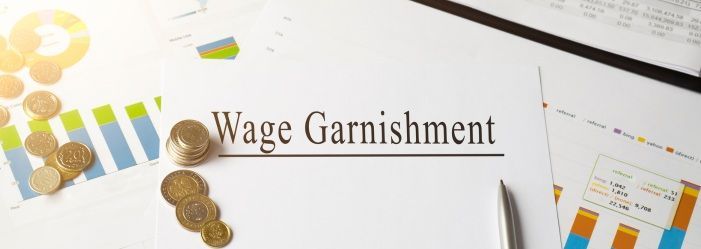Last Updated: February 23, 2024
Prevent or Limit Your Wage Garnishment

Disclaimer: We are not qualified legal or tax professionals and are not giving advice. Always speak with a qualified professional before making any legal or financial decisions.
Wage garnishment can be a daunting and stressful experience, especially if you're already struggling to manage your finances. When a court orders a portion of your earnings to be withheld to pay off debts, it can significantly impact your ability to cover essential expenses. However, there are effective strategies you can employ to prevent or limit the effects of wage garnishment.
Understanding your rights and the legal processes involved is the first step toward regaining control of your financial situation. This article will guide you through actionable steps to challenge wage garnishment, explore alternatives, and potentially stop it from happening. With the right approach, you can navigate through this challenging time and work towards a solution that protects your income and peace of mind.
If you'd like to skip the article and speak to a debt specialist right away, click here for a free consultation.
Know Your Rights
First and foremost, you should know your rights when it comes to wage garnishment. Not only can you challenge the wage garnishment before it happens, but if the court orders a wage garnishment then there are certain rules that must be followed for both employer and employee.
This means that your employer is not allowed to keep any funds from your paycheck in order to pay down debts such as child support or taxes unless they are ordered by law to do so.
For example, when you file bankruptcy, this will usually stop all wage garnishments including those on behalf of other creditors like student loans or credit card bills because priority is given first to these types of debt holders.
What is Wage Garnishment?
Let's break down what wage garnishment really is. Wage garnishment is when a court order is obtained to take money from your paycheck and give it to someone who has sued you. The most common reason for wage garnishment is when somebody owes back child support or taxes. Wage Garnishment Basics
A wage garnishment is when a court orders your employer to withhold money from your paycheck to pay certain debts you owe.
Common types of debt that can lead to wage garnishments include:
- Back taxes
- Child support
- Student loans
- Consumer debts ruled on in court
How Wage Garnishments Work
If you fail to pay a debt, your creditor can sue you and get a court judgment stating you owe the money. This allows them to request that a portion of your paycheck is withheld by your employer and sent to them to pay off the debt.
- What Types of Debts Can Lead to Wage Garnishments
- As covered above, common sources are unpaid taxes, overdue child support, defaulted student loans, and consumer debts like medical bills, credit cards, personal loans etc. Typically the creditor must first win a lawsuit against you in court for the right to garnish wages.
- How Much of Your Wages Can Be Garnished
- Federal law sets limits based on your disposable earnings and whether you are supporting a spouse/dependents. Generally, the max is 25% if you earn more than $217/week, or $942/month. For lower incomes, the percentage falls to as low as 0%.
- How long does wage garnishment last?
- The only way wage garnishment can be ended early on is if they are able to make payments over time, by an agreement with the creditor in question. However, this will not typically happen because of interest rates attached to unpaid debts as well as other fees involved which continue adding up over time without being paid off.
How do I know if my wages are being garnished?
In some cases, your employer may tell you that they cannot pay you until the amount owed has been reduced by what was taken from them through garnishment.
Another sign that can indicate potential wage garnishment is when an employee's paycheck lasts only part of the time before going back down to zero again. Either one of these signs could mean there is possible debt collection taking place against their wages (whether child support payments or other forms).
Try to Get an Extension on the Debt
Always ask if you can get an extension on your debt. That way, the garnishment will be delayed until you have paid back what is owed.
Talk to your employer about the wage garnishment process
If someone contacts your work with a request for funds from that employee, it would only make sense to talk to your boss or manager right away. This conversation should include details on why they are being asked to pay and how much their wages might be deducted while they take care of this issue.
Stop wage garnishments if there is no valid judgment order in place
In some states such as California, when a creditor has filed against them but does not yet have a court judgment ordering deductions from one's paycheck because they owe that individual money then the debtor can stop any future collection.
The Different Types of Wage Garnishments and their Effects on your Paycheck
Wage garnishments are legal and typically court-ordered. There are generally 3 types of wage garnishment - federal, state, and private.
Federal wage garnishments come from the IRS to collect taxes due on money owed.
State wage garnishments can be a remedy to back payments on child support or public benefits; they can also help enforce judgments against third parties for injuries or damages when these debts have been "transferred" from one person to another via lawsuits.
Lastly is the private wage garnishment that comes from governing agencies such as creditors, landlords or other entities authorized by law in your state. The agreement between your employer and this agency will define how much of your wages may be remitted every pay period to meet an outstanding debt.
Consider bankruptcy as a last resort
One last resort option you can always consider is bankruptcy but bankruptcy law is complicated and the process can be expensive.
You may want to consult with a financial advisor before deciding on this option for getting out of debt.
Contact your state’s attorney general representative or other government agencies handling consumer complaints, depending upon who garnishes your wages; they're usually required by federal law to provide a free copy of their wage garnishment pamphlet if you ask for it."
Read the Top 10 Most Common Bankruptcy Questions
In addition to contacting these services first, there are several things that you should do as soon as possible: contact your employer's human resources department about what type of wage garnishment order has been filed against you - some states require employers to notify employees when an order is issued against them.
FAQs
Conclusion
If you are faced with a wage garnishment, then it's important to understand your options, as well as your rights. You may be able to get the order reversed by filing a motion for relief and submitting an affidavit. This will work if you can show that your income is below the federal poverty line in your state, or that the imposition of another form of execution on wages would result in irreparable injury or injustice.
It's also possible to file bankruptcy which could stop wage garnishment altogether when done correctly (although this should only be considered as a last option). Remember, there are many ways to deal with these issues so don't give up hope!
*Disclaimer: Pacific Debt Relief explicitly states that it is not a credit repair organization, and its program does not aim to improve individuals' credit scores. The information provided here is intended solely for educational purposes, aiding consumers in making informed decisions regarding credit and debt matters. The content does not constitute legal or financial advice. Pacific Debt Relief strongly advises individuals to seek the counsel of qualified professionals before undertaking any legal or financial actions.
✔ Accredited by Better Business Bureau with BBB A+ rating (4.93 rating and 1678 reviews)
✔ US News and World Reports and Bankrate ranked Pacific Debt Relief as one of “The Best Debt Relief Companies of 2024”
✔ 6.9 star rating by BestCompany.com (over 2379 client reviews)
✔ 4.8 star rating by TrustPilot based (over 1613 verified consumer reviews)
✔ ConsumerAffairs.com Accredited (over 544 verified reviews with an average rating of 5 stars)
✔ A Top 10 Rated Compan by TopTenReviews.com , ConsumersAdvocate.com and Top10debtconsolidation.com
✔ 4.6 star rating by Google (229 client reviews)
✔ 100% rating by SuperMoney (9 client reviews)
Reduce Your Credit Card Debt By Up to Half

BBB Reviews | 4.9/5.0 Rating









 Do Not Sell My Personal Information
Do Not Sell My Personal Information